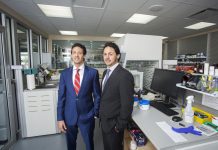Integrated Medicine is the Key to Success
Farid Wassef is not your typical pharmacist. Here’s a look at how he developed his store and practice and why he’s now running for office to try to make positive changes to the health care system.
By: Nancy Ripton
Photography: John Milios
“When you act in the interest of the patient – and put their interest before your own – you provide optimal health care,” says Farid Wassef. It was this thinking that encouraged Wassef to open a clinic adjacent to his Stouffville, Ontario pharmacy practice 20 years ago. In fact, Wassef has always felt that integrated medicine is in the best interest of everyone involved in health care.
Born into Pharmacy
Wassef is a second-generation pharmacist who has worked and lived in Stouffville, Ontario for over 40 years. The family pharmacy was first owned by Wassef’s father Lou Wassef who purchased the pharmacy in 1974 after emigrating from Egypt in 1968 when Farid was just four years old.
Growing up, Wassef helped out in the family pharmacy and saw at an early age the need for alternative forms of health care. “Even then I could see the effect the environment, stress, diet, lack of exercise – so many things – were contributing to people getting chronic illness. They just weren’t being addressed,” says Wassef.
After graduation from the Massachusetts College of Pharmacy in 1989, Wassef took over management of the family pharmacy and his disillusionment with traditional medicine continued to grow.
“The pharmacist typically has two or three minutes to spend with a patient when they are giving them their prescription,” says Wassef. “I became very frustrated with this model that only allows a couple of minutes to interact with a patient at the pharmacy counter.” Wassef felt he had more to share than that amount of time could afford.
Changing the Definition of Pharmacist
In 1993, Wassef decided to set up a clinical practice to support his pharmacy. “When I started there was a very narrow view that people got sick because of genetics,” says Wassef. “I took a lot of pain and inflammation syndromes that went un- or over-treated with medications and helped patients understand that they had other options.”
His patient consultation practice involved integrating lifestyle changes, nutrition, and natural health products with pharmaceutical care. “Within the scope of the practice of pharmacy, a pharmacist is permitted to counsel on prevention and treatment of disease, counsel on diet, lifestyle, nutritional and nutraceutical supplements, botanical medicines, and – of course – pharmaceutical drugs,” says Wassef. “While a pharmacist may not be permitted the act of diagnosis, I found many MD’s in the Stouffville and the surrounding area were eager to collaborate with an objective and evidence-based person providing good information on natural medicines. Through these collaborations we were able to offer patients a broad array of integrative diagnostic techniques in addition to standard laboratory procedures.”
Of course, it wasn’t easy finding doctors to collaborate with at first. “People started singing praises to their physicians,” says Wassef. “People were getting better and it was a threat to physicians at first until they realized we could work together.”
The idea of a pharmacist talking about alternatives to prescriptions may at first seem counterintuitive but in addition to being best for the patients it is also a great business decision.
“Pharmaceutical companies realized that they can’t over market to the point where their product becomes misused and is taken off market,” says Wassef. “They want to make sure the drugs are taken appropriately.” The discontinuation rates for most drugs are high after six months. If you give less medication (to people who are healthier and eating right) they are more likely to stay on it for longer and have better results.
“There is a pharmaceutical shift to promoting exercise, diet and fish oil,” says Wassef. Even Pfizer now owns Emergen-C. The pharmaceutical companies are becoming integrated and more patient centered and focused on health.
Wassef’s father (who passed away in 2004) was supportive of his son from the beginning. “Coming from Egypt the idea of alternative medicine wasn’t foreign to him,” says Wassef. “He would compound Echinacea and ginseng in 50s and 60s.” He adds that “Ultimately, it’s about good medicine and good outcomes for the patient.
Extending His Reach
Wassef was not satisfied with his role as pharmacist and practitioner. He was driven to spread the word to other pharmacists, doctors and anyone else who would listen as to the power of diet and lifestyle in health promotion, disease prevention and disease treatment. He was also eager to educate his fellow pharmacists as to the role they could and should be playing in their patients’ care.
Working with the Institute of Functional Medicine (whom Wassef credits with providing most of the training he relies upon as a practitioner of integrative medicine), Wassef created a continuing education curriculum for pharmacists to receive training in integrative medicine. He also lectures across North America to pharmacists and doctors regarding application of integrative medicine, and methods through which integrative minded pharmacists can successfully collaborate with MD’s in their community. His immense efforts to move the discipline of integrative medicine forward earned him the 2006 award for Canadian Pharmacist of the Year.
While juggling the roles of a pharmacy manager, seeing 80-plus patients per week, authoring over 200 articles, CE courses, and books (including Breaking the Age Barrier – Strategies for Optimal Health, Longevity, and Energy published by Penguin in 2003), and his ongoing industry consulting and speaking engagements, yet another intriguing path caught Wassef’s eye – politics.
The idea of impacting healthcare from a “top down” approach made a lot of sense to Wassef. “I’ve been a strong advocate for my profession for last 20 years,” he says. “I got tired of hearing I had lovely ideas, but there’s no money. There is money! It’s just being wasted. Our current health care system is not in the best interest of the public.”
Wassef slowly molded his career to be able to take on the workload politics would entail. He sold ownership of his pharmacy and merged with the local IDA team, where he maintains an office and his practice to this day. He cut back on time with patients, yet maintains an important practice within the Stouffville IDA pharmacy, and continues to welcome public speaking arrangements.
It was 2009 when Wassef first actively participated in a political role, attempting to block proposed cuts to the healthcare system (that subsequently came into effect in 2010). The final straw that brought Wassef to action was the interpretation that the $1.2 billion e-health scandal is what necessitated healthcare cuts in the first place. (They’ve now spent two billion.)
The PC party of Ontario approached Wassef in 2010 after witnessing his passion and determination to change the system. In 2011 he secured his nomination as the PC candidate for the riding of Stouffville, Markham, Richmond Hill, and King townships. He lost the 2011 election to the incumbent Liberal candidate, but Wassef has been re-nominated and will stand in the next general election as the PC Candidate for Oak Ridges-Markham for Member of Provincial Parliament.
Wassef is determined to improve our healthcare system, which he believes should focus more on disease prevention and extending an individual’s functional health. He wants the money to go where it can be most effective. To move the system more towards preventative care and to stop over- and mis-appropriate prescriptions. Now that’s something we can all cast our vote for.
Pull quotes:
The practice of integrative medicine begins, grows, and thrives through one common seed – passion. Passion to help others, to solve mysteries commonplace answers simply don’t make sense for and, ultimately, to achieve maximum positive impact for people using the least invasive strategy available.
Weight loss, prevention of cold and flu, arthritis and sleep issues are the four most common complaints Wassef hears. Natural alternatives can help with all of them.







